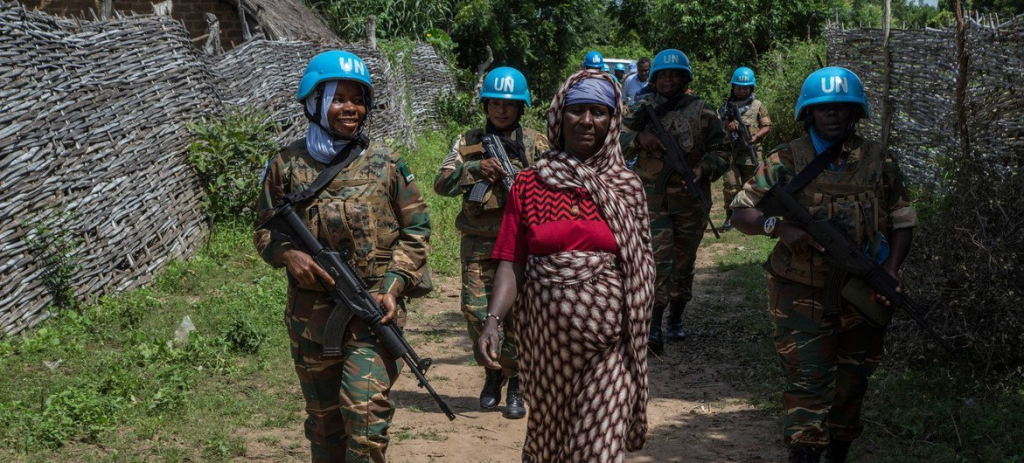Women in Peace and Security: The Forgotten Frontliners
By Divine Adongo | Voices of Africa

Women UN peacekeepers from Africa are playing an indispensable role in supporting peace and security in communities transitioning from conflict to peacetime.
In the heart of northern Nigeria, while armed groups storm villages and political leaders hold endless meetings, a group of women quietly gather under a neem tree. They are not diplomats. They hold no titles. Yet they have negotiated ceasefires, brokered prisoner releases, and kept entire communities from collapsing. Their names are not in newspapers. Their stories rarely reach policy tables. But without them, peace would be impossible.
Across Africa, from the hills of Burundi to the deserts of Mali, from conflict zones in the Central African Republic to post-crisis communities in Liberia, women have long been the invisible architects of peace. When men go to war, it is women who patch together what is left — homes, families, and fractured hope. When communities fracture along ethnic or political lines, it is women who cross borders, not with weapons, but with words and woven baskets, offering food, comfort, and dialogue. And when the silence of trauma fills the air after the guns go quiet, it is women who create spaces for healing.
Yet, despite this undeniable contribution, women remain grossly underrepresented in formal peace processes. Less than 10% of negotiators in peace talks across Africa are women. Even fewer occupy seats at national security councils or defense ministries. This is not only unjust — it is a profound strategic failure. Decades of research and experience confirm what African communities have known intuitively: when women are involved in peace processes, the outcomes are more durable, inclusive, and transformative. Excluding women from peace is not only morally wrong — it is politically reckless.
The reasons for this exclusion are deeply rooted. Patriarchy is both a culture and a system — one that tells women their role is to mourn the dead, not to prevent the killing. In many African societies, women’s contributions to peace are seen as “natural” extensions of their caregiving roles, not as leadership. Religion, custom, and tradition are often misused to silence female voices, while conflict itself amplifies gender inequalities. In times of war, women’s bodies are battlegrounds — sites of violence, control, and humiliation. Yet when the time comes to negotiate peace, their perspectives are forgotten.
And yet, women persist. In Liberia, it was women in white — led by Leymah Gbowee — who brought warring factions to the table and helped end a brutal civil war. In South Africa, women’s organisations were instrumental in shaping the post-apartheid constitution. In Kenya, Somalia, Zimbabwe, and the DRC, women peacebuilders continue to mediate between militias and communities, disarm child soldiers, and run trauma support groups — often with little more than local trust and relentless courage. They are peacemakers, not because they were invited, but because the alternative — doing nothing — would be worse.
The question we must now ask is simple: what would African peace and security look like if women were not just participants, but leaders? If women sat at every decision-making table where budgets, borders, and bullets are discussed? If national security strategies centered not only on guns and armies, but on social cohesion, education, reproductive health, and economic justice — the very things women have long championed?
To get there, we must dismantle the barriers that exclude women. We must pass and enforce gender quotas in political and peace institutions. We must fund women-led grassroots initiatives, not just elite NGOs. We must educate our boys to see women as equals and our girls to see themselves as leaders. Most importantly, we must listen — truly listen — to the women already doing the work on the frontlines.
The African Union has recognised this through its Women, Peace and Security (WPS) agenda, aligned with UN Security Council Resolution 1325. But resolutions mean little without implementation. The time has come for governments, civil society, and Pan-African movements to move from recognition to action. Peace cannot be patriarchal. The liberation of Africa is incomplete if it excludes half the population from deciding its future.
African women are not waiting for permission. They are already leading — in silence, in shadows, in small victories that often go unnoticed. But imagine what they could do with full power, full recognition, and full support.
Peace in Africa will not be sustainable until it is shared. And it will not be shared until women — women-the mothers of nations, the keepers of community, the healers of war — are no longer footnotes, but frontliners.



